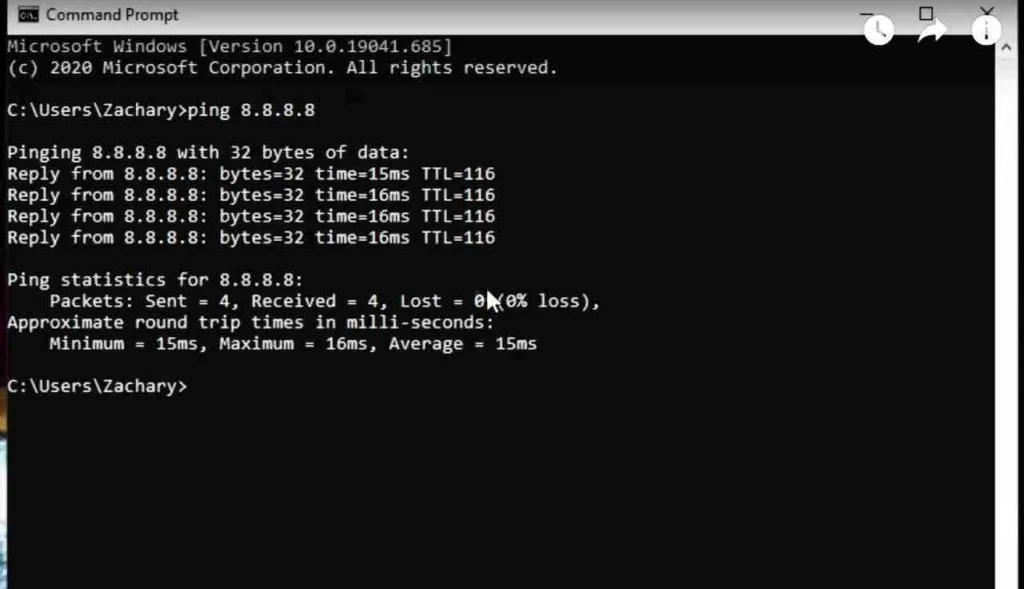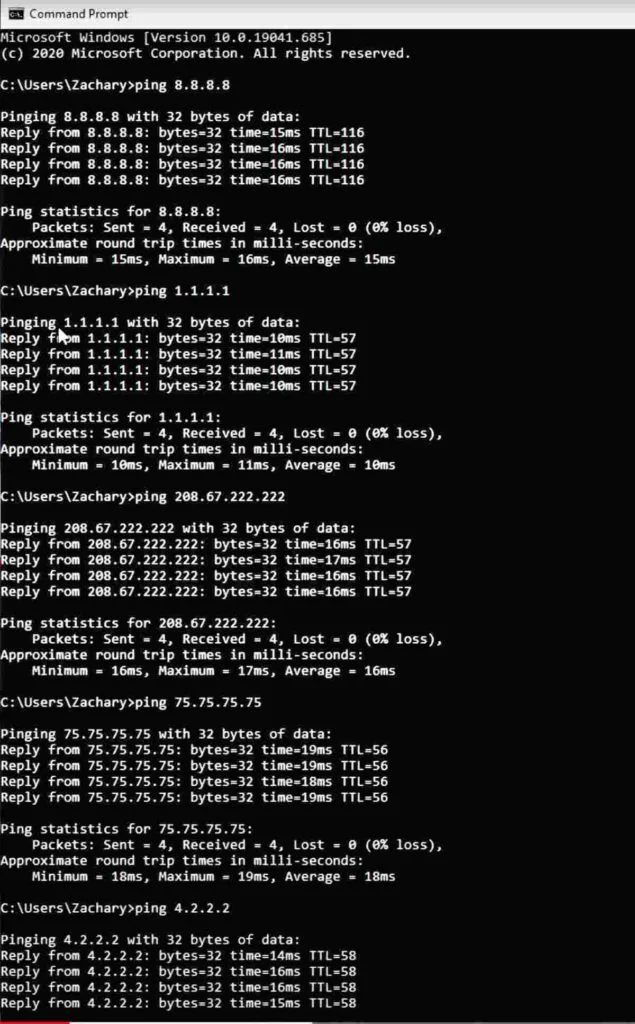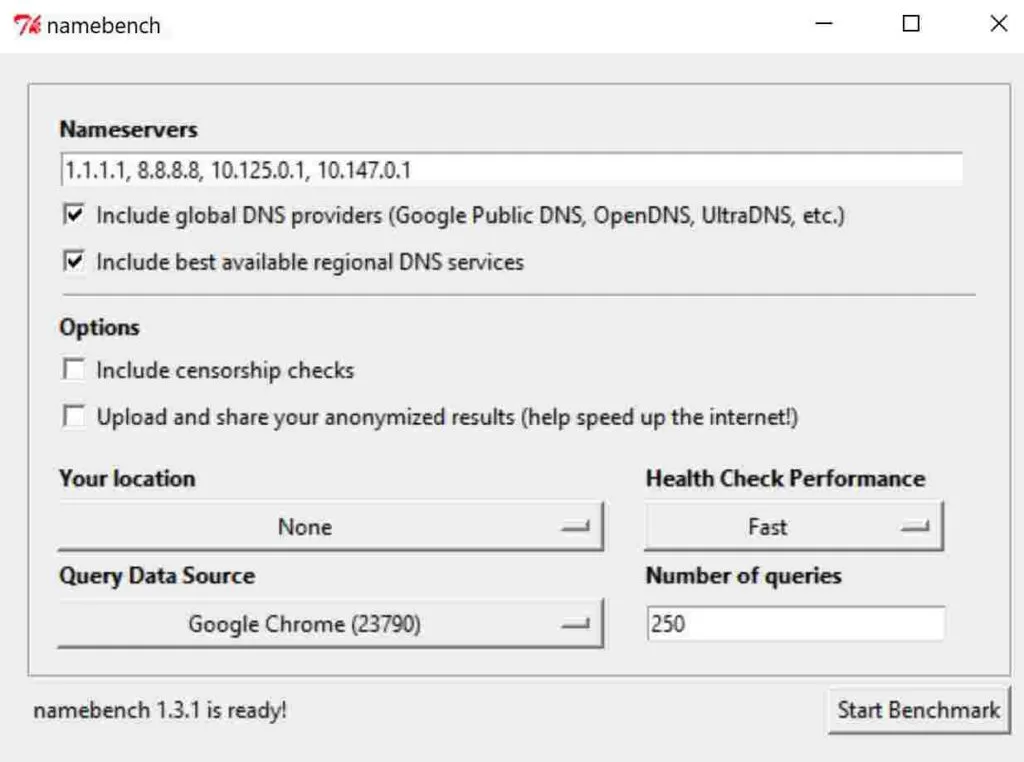Are you using the best DNS server for Fortnite? There are many options to choose from when selecting a DNS server to use on your network. Choosing the server with the lowest latency (ping) will result in reduced lag and a more stable connection. There is no one size fits all choice that will work great for everyone. Your location and your internet service provider’s routing will make a huge difference. The best DNS server to use for Fortnite will be different for everyone.
Many gamers provide blanket statements such as to use 8.8.8.8 or 1.1.1.1. Although those can work great in many cases, they are not the best choice for everyone. That is why it is best to test it for yourself.
This test will provide you with all the information you need to choose the best DNS server. This process works the same way regardless of if you are playing on PC, PlayStation, Xbox, or any other system.
Table of Contents
Why DNS Exists
Computers speak in numbers, and humans speak in verbal languages. Long numbers are not memorable to most people. If DNS did not exist, websites would have to be accessed using their IP address. For example, visiting Amazon would require entering 195.123.147.219.
This would be how all websites would have to be accessed. This would not be a good experience. For this very reason, DNS was developed to translate between domain names and IP addresses. DNS has been a core element of the Internet since 1985. It remains extremely relevant today, and with IPv6, it will be more important than ever.
How DNS Latency Affects Fortnite
Latency, also referred to as ping, is the round trip time for a packet of data to reach its destination and return. The lower the latency, the more responsive your browsing experience. This is especially important for gaming because nobody likes to experience lag when playing online multiplayer games. DNS is one of several factors that can impact your latency when playing games such as Fortnite.
Despite popular belief, your DNS server choice does not in any way affect your bandwidth (download + upload speeds). It can, however, make websites feel more responsive by reducing the initial latency involved with name resolution. If you are looking to test your internet speed, please check out this post. Latency performance is actually much more critical for Fortnite gaming than bandwidth. Fortnite requires very little bandwidth. Anything 5 Mbps or higher is plenty. Latency is what counts when you want a lag-free online gaming experience on any platform. This applies equally whether you are playing on PC, Xbox Series X, PS5, Xbox One, PS4, or any other system. Learn more about Reducing Your Latency in Fortnite.

The Best DNS Server for NA East
In North America, Fortnite has separated its servers into an east and west region. This allows for lower latency by reducing the distance between the players and the servers. The main servers for NA East are located in northern Virginia, near the border of Washington, DC. Fortnite runs almost entirely on Amazon Web Services (AWS) servers.
It is often recommended by gamers to use either 1.1.1.1 or 4.2.2.2 as your DNS server to get the lowest latency when connecting to NA East servers in Fortnite. In many cases, these choices work out great and reduce latency. That said if you really want to be sure you are getting the lowest latency, you will need to test it for yourself.
The Best DNS Server for NA West
The main servers for NA West are located in northern California and Oregon. Fortnite runs almost entirely on Amazon Web Services (AWS) servers.
It is often recommended by gamers to use either 1.1.1.1 or 8.8.8.8 as your DNS server to get the lowest latency when connecting to NA West servers in Fortnite. In some cases, these choices work out great and reduce your latency. That said, if you want to ensure you are getting the absolute lowest latency, you will want to test it for yourself.
Testing Your DNS Latency Using the Ping Command
With this method, we are going to use either the command prompt on Windows or the Terminal on Mac or Linux. I am going to be showing the process on Windows, but the process is exactly the same on Mac or Linux.
We will be using the ping command for this test. This is run by typing in the word ping followed by the IP address and then pressing enter. You will then get a series of replies back from the server with the latency listed beside it. Latency is measured in milliseconds ms. The lower, the better. If you get an error, make sure you are putting a space between the word ping and the IP address.
Here is an example.

There are thousands of DNS server choices out there. Listed below are the DNS servers that I advise testing. These are all from reputable providers. I do not recommend using a DNS service that is unknown because it could be putting your privacy and security at great risk. Whoever you choose as your DNS provider can see what websites you visit and when.
| DNS Provider | Primary DNS IP Address |
| 8.8.8.8 | |
| Cloudflare | 1.1.1.1 |
| Open DNS | 208.67.222.222 |
| Comcast | 75.75.75.75 |
| Level 3 Communications | 4.2.2.2 |
| Quad9 | 9.9.9.9 |
After testing all of the DNS servers, you will end up with data that looks something like this.

From here, you will easily see the DNS server with the lowest latency. This will differ for everyone. In my case, Cloudflare’s 1.1.1.1 was the best choice, followed by Level 3’s 4.2.2.2.
You have now identified the optimal DNS server to use for Fortnite. Ideally, I would recommend running this test at least yearly because things change over time.
Testing Your DNS Latency Using Namebench
Another option is to use a software utility to test your DNS latency. I recommend using Namebench. Namebench is an open-source DNS benchmark utility maintained by Google. It is an easy way to test a large number of DNS servers automatically. To get started, download Namebench from here. Choose the version you need, whether for Windows, Mac, or Linux.
You will then want to run the Namebench utility. The default settings are fine, and you do not need to change anything. When the utility finishes, you will see a list of DNS servers in order of latency from lowest to highest.
As I previously stated, I do not recommend using a DNS service that is unknown because it could be putting your privacy and security at risk. Whoever you choose as your DNS provider can see what websites you visit and when. Stick to a reputable provider, even if it means an extra millisecond or two.

Changing Your DNS Settings
Now that you have run the test and determined the optimal DNS server, you will need to configure your DNS settings. You can either configure them on your gaming console / PC or on your router. I recommend configuring it on your router if possible, as it will automatically change your DNS server on all of your connected devices. If your router doesn’t allow you to change your DNS settings, you may have to set it on your gaming device. This will work the same way and offer the same benefits. Setting it in the router is just more convenient than changing your DNS settings on multiple devices.
When it comes to setting your secondary DNS server, you have a couple of options. The function of having a secondary DNS server is redundancy. If the primary DNS server goes down for any reason, your secondary DNS server will seamlessly take over. For your secondary DNS server, you can either use the secondary DNS associated with your primary DNS (Example 8.8.8.8 with 8.8.4.4 and 1.1.1.1 with 1.0.0.1.) or you can simply use the second best from your test as the secondary DNS server. Either method is perfectly fine and will likely make no difference at all.
With your DNS settings updated, you should now see the reduced latency. Remember that if your latency is still higher than you would like, DNS is only one factor that can affect your latency. Other factors, including your internet service provider and the level of congestion on the game servers, play a larger factor than your choice of DNS server.

Joe
Thursday 29th of June 2023
What about best dns for central?
Zachary Harper
Monday 3rd of July 2023
Generally 1.1.1.1 or 4.2.2.2 is a good choice for most people.